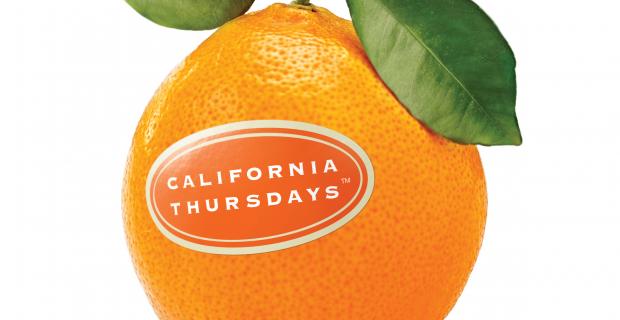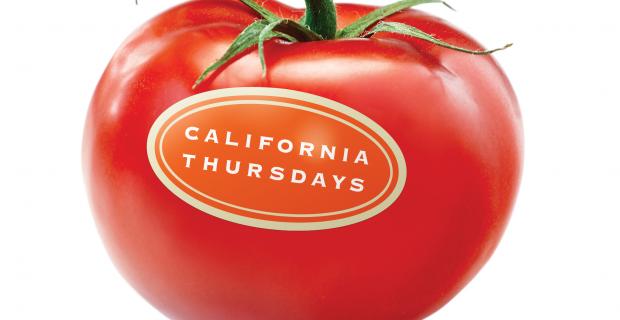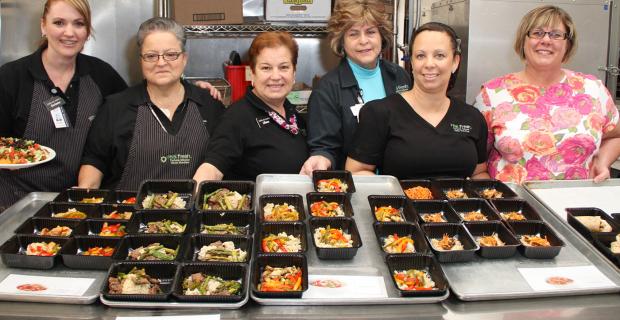Minneapolis Public Schools Rethink School Lunch

You know you're onto something when temperamental teens are promoting the school lunch — without even being asked. That's precisely what happened in the fall of 2012 when Minneapolis Public Schools' nutrition services director Bertrand Weber started testing new meals in all of the district's high schools on Thursdays. By the second week, word-of-mouth buzz was building, and handmade posters proclaiming "Real Food Thursday!" appeared.
"The question was: If kids are presented with green salads, roasted veggies, and other real foods, would they actually take them? Or would they stick with a big protein as the centerpiece of the meal?" says Weber. "Everyone was shocked to see that yes, they want the protein, but they also want the salads and veggies."
Among the favorite new dishes: Elementary and middle school students love the sweet & sour chicken, chicken mole with brown rice, and edamame & corn succotash bean salad. High school hits include the herb-roasted chicken leg, Texas caviar, roasted summer squash, and Italian porchetta. And the winner of a district-wide recipe contest is now a signature item at all schools: butternut squash turkey chili, made with all local ingredients.
Having studied at the prestigious Ecole Hotelière de Genève, the Swiss-born Weber has an extensive background in hospitality management; he helped run upscale hotels and resorts on the East Coast for more than two decades. In 1991, he arrived in Minnesota to oversee an independent hotel. Six years later, his seven-year-old son's pancreas suddenly shut down; he was soon diagnosed with Type 1 diabetes. Taking a year off from work, Weber met his son at school every day during lunchtime to administer his insulin shots and monitor his carb intake.
"I became very interested in the school lunch there, which I found to be pretty appalling," he recalls. "I started thinking more about all the issues — not just diabetes but obesity, cardiovascular disease, and other health problems. I started looking into the source of it: all the chemicals, additives, and preservatives that we're pumping into our bodies and promoting."
But it wasn't until 2002 that Weber found the right opportunity to do something in the suburban Hopkins School District. Due to the small size of the district and the fact that all its schools had fully operating kitchens, change occurred relatively quickly: "In the first year, we went from standard processed food to 98-percent scratch cooking, eliminated all trans fats and high-fructose corn syrup, and introduced rBGH-free milk." Weber also joined forces with the University of Minnesota and JoAnne Berkenkamp of the Institute for Agriculture and Trade Policy for "The Power of 3," a comprehensive program to increase consumption of whole grain foods by elementary school students. And he got the district involved in Minnesota's farm-to-school program.
Weber later took a position as the director of wellness, nutrition, and culinary standards for a private food service management company. But he missed being in contact with children and on-the-ground food service. Then one day, he met with Megan O'Hara, cochair of the sustainable food initiative Homegrown Minneapolis and wife of city mayor R.T. Rybak. O'Hara mentioned that Minneapolis Public Schools (MPS) — which serves an average of 11,000 breakfasts; 21,000 lunches; and 4,500 snacks a day; a total of 6.2 million meals a year — was looking for a new nutrition services director.
In January 2012, Weber took the reins of food service for the district, which comprises seven high schools, nine middle schools, 18 K–8 schools, 24 elementary schools, and four alternative schools. Eighty percent of the schools had no kitchens. A central commissary simply repackaged entirely processed food into individual portions and dispatched them to all schools for reheating. "It was never a complete meal — just protein at the center, plus raw vegetables and fruit in little plastic baggies," says Weber.
The numbers told the story. More than 65 percent of the district’s 35,000 students are eligible for free and reduced-price meals — and yet some 36 percent of the total population were choosing not to participate in the school lunch program as of February 2012. Among high school students, 45 percent did not eat school lunch, and only 30 percent of students paying full price were selecting the lunch option.
In his first week on the job, Weber recalls, "I let everyone know that we were bringing real food back to the district. We would no longer be known as the NUT (Nutrition) Center; we would now be known as 'Culinary and Nutrition Services.' I had no clue what we were actually going to do, but that was my message." He attended PTO meetings and community meetings to build support, and he spent time brainstorming with his staff. “It was very important to me that they truly understood why we needed to change things," he said.
To hatch a coherent business plan, Weber turned to the Center for Ecoliteracy. "I had been following their website for years, downloading every possible download," he says. Using the Center's Rethinking School Lunch (RSL) framework, Weber laid out an ambitious five-year plan entitled "Rethinking MPS School Lunch" that addressed all of RSL's ten dimensions of school food service.
Another driving force was the Center's Rethinking School Lunch Oakland feasibility study, as Weber saw many parallels with his own district, including the size and diversity of the student populations, the percentage of students qualifying for free and reduced-price lunch, and inadequate facilities as a barrier to food reform.
Since then, hydrolyzed vegetable protein (HVP) and irradiated meats of any kind have been banned. All high schools are now fully converted to scratch cooking, with six new stations serving up ethnic foods, classic hot sandwiches, traditional comfort foods, freshly made pizza and pasta, and deli salads. All high schools offer salad bars showcasing local, seasonal ingredients and an array of legume and whole grain salads such as wheatberry salad, wild rice salad, and quinoa tabbouleh. The cafeterias use fully compostable plates and utensils. Professional development is an ongoing priority. And high school participation has increased by 30 to 40 percent, while the number of schools serving breakfast in the classroom has tripled.
"I've been getting emails from associate principals and teachers who are noticing an incredible behavioral change in the cafeteria, from students being loud and having food fights to sitting down like young adults and having conversations," he says. "The cafeteria staff is excited because they're getting compliments from the teachers and kids. And our custodians are observing no waste, so the kids are actually eating what they're taking."
Change has been slower at the elementary and middle school level due to a lack of kitchens. However, two schools now have salad bars, and after receiving food in bulk from the central kitchen, finish the food preparation onsite. This year, six more elementary schools will be converted to finishing kitchens, while four middle schools will undergo facility conversions to full scratch cooking. And 20 more salad bars are on the way.
"Right now, I'm focused on changing perceptions of the food as well as the food itself," he says. "But with time, all of the Center for Ecoliteracy's RSL dimensions will come into play."
MPS will complete its own feasibility study, similar to what the Center pioneered in Oakland, to create a comprehensive roadmap for district-wide food reform. It plans to launch a "summer food truck" to provide free meals for the city's children, eliminate plastic packaging, and train chef-based instructors to help introduce new foods and recipes in the cafeterias. Weber also hopes to partner with two urban farms to procure more local ingredients and engage in educational outreach.
In the end, Weber just wants the next generation to know and love food in its natural state. "We’re not meant to eat what society is telling us to eat," he says. "We’ve got to get back to basic food. It’s not that complicated, and kids actually like it. It took many years for us to move to processed food, so it’s going to take a long time to go back. But we can’t afford not to do it.”




